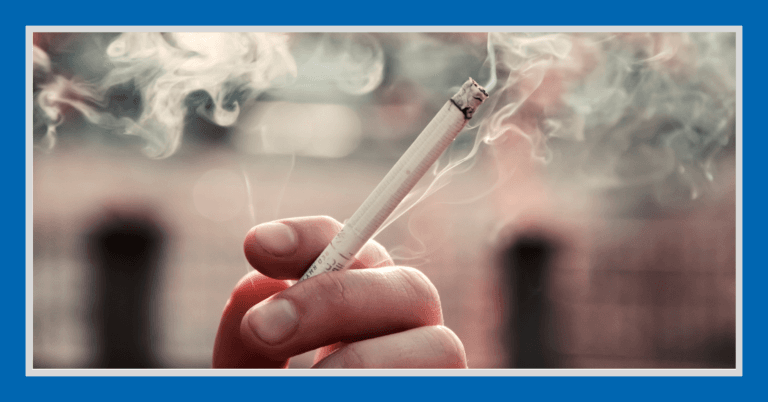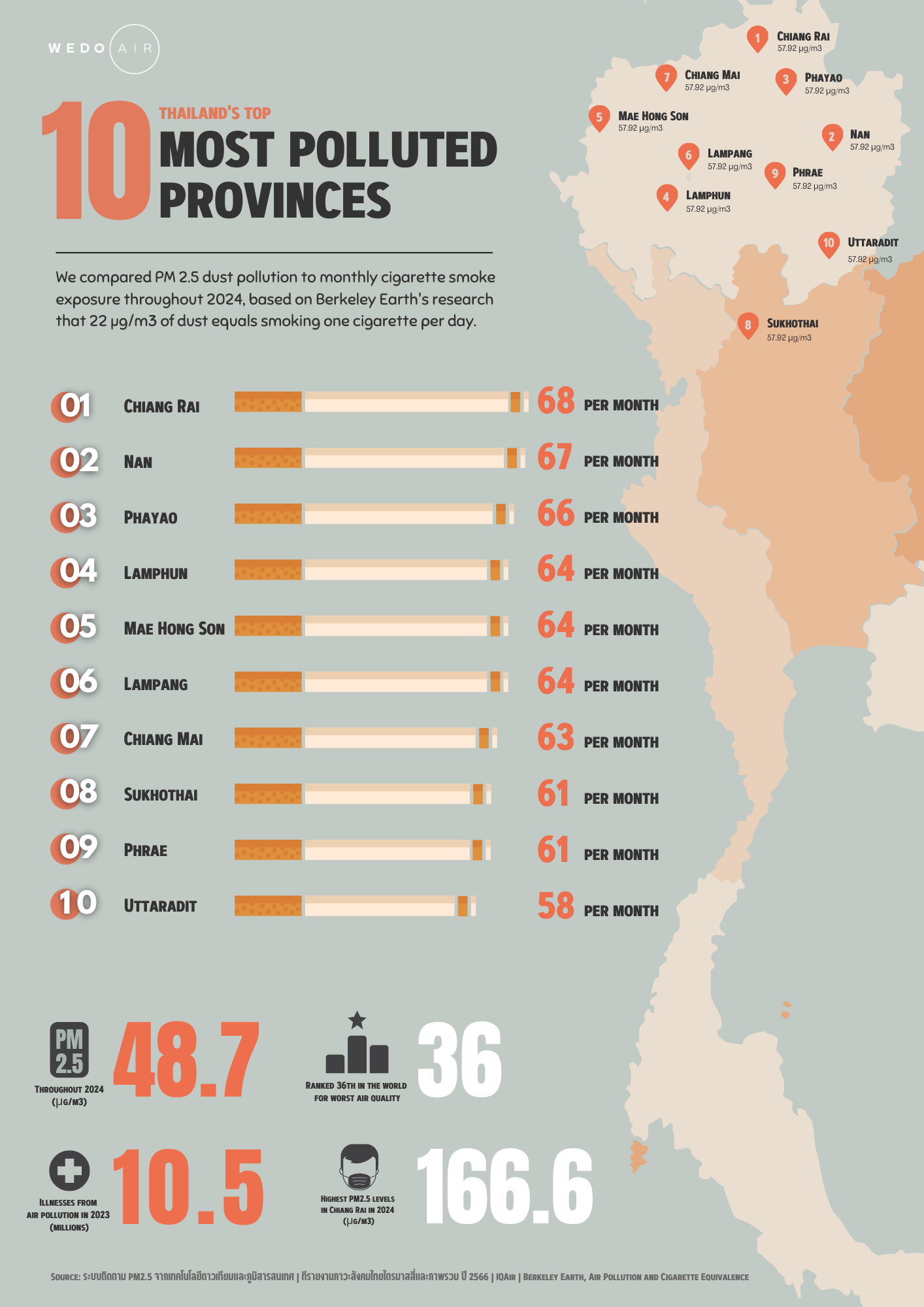
Thailand’s Air Pollution: How Many Cigarettes Are You Indirectly Smoking?
by Peemanus Tongpiem / October 13, 2024
Air pollution has become a significant concern worldwide in recent years, with Thailand being no exception.
The air quality in Thailand fluctuates between hazardous and unhealthy levels, particularly during the cold season from December to April. This results in severe health implications for its residents.
To highlight the severity, consider this: the impact of breathing polluted air can be equated to smoking cigarettes. But how many cigarettes are you indirectly smoking due to Thailand’s pollution levels?
We analyzed data from January to June 2024 from Thailand’s most polluted regions to determine the comparison. Read on to discover the results and understand the true impact of air pollution on your health.
The Concept of Cigarette-Equivalent Pollution
Scientists compare pollution exposure to cigarette smoking to highlight health risks. Inhaling PM2.5 can be equated to smoking cigarettes. A study by Berkeley Earth found that an increase of 22 micrograms per cubic meter (µg/m³) of PM2.5 is roughly equivalent to smoking one cigarette per day. This comparison illustrates the severity of air pollution in simple terms.
Air Pollution Levels in Thailand January – June 2024

Our analysis shows that Chiang Rai, Nan, and Phayao are the most polluted provinces in Thailand, with PM2.5 levels equivalent to smoking approximately 68 cigarettes per month.
Chiang Mai also faces significant pollution, equating to smoking about 64 cigarettes monthly.
Conversely, the provinces with the best air quality include Krabi, Surat Thani, and Chumphon, with pollution levels equating to less than 25 cigarettes per month.
In Bangkok, the PM2.5 levels correspond to smoking about 38 cigarettes per month, indicating moderate air pollution compared to other regions.
Throughout 2024, the average PM2.5 level across the country is 48.7 µg/m³, indicating a high baseline of air pollution.
Thailand ranks 36th in the world for worst air quality and 10.5 million illnesses in 2023 were attributable to air pollution, highlighting the public health crisis.
These statistics underscore the severity of air pollution in Thailand, particularly in the northern regions. The high levels of particulate matter and other pollutants pose serious health risks to the residents, making it imperative to implement effective measures to improve air quality and protect public health.
Click here to view the table showing how many cigarettes people in each Thai province are indirectly smoking due to PM2.5 air pollution.
Chiang Rai: Thailand’s Most Polluted Province

Chiang Rai is the most polluted province in Thailand, with an average PM2.5 level of 50.3 µg/m³ from January to June 2024.
This level of pollution is equivalent to residents “smoking” 68 cigarettes per month, posing severe health risks.
On April 6, 2024, the PM2.5 concentration peaked at 166.6 µg/m³, highlighting the severity of the pollution.
The 5 districts with the highest air pollution levels in Chiang Rai are:
Chiang Rai’s average PM2.5 level of 50.3 µg/m³ is significantly higher than the WHO standard of 10 µg/m³. Calculation of damage to human health results in an average reduction in life expectancy by 4 years, 1 month, and 25 days.
This level of air pollution negatively impacts health, as indicated by the Air Quality Index.
People should wear a PM2.5 mask when outside and limit strenuous outdoor activities. Those at higher risk, including the elderly, children, and individuals with pre-existing health conditions, should avoid outdoor activities.
If outdoor exposure is necessary, use PM2.5 masks and watch for symptoms like coughing, difficulty breathing, or eye irritation. Consult a doctor immediately if any unusual symptoms occur.
Staying indoors with air purifiers can also help reduce exposure to harmful pollutants. Air purifiers equipped with HEPA filters are particularly effective, as these filters can capture almost 100% of particles as small as 0.3 microns, including PM2.5.
Air Pollution Crisis in Chiang Mai

Chiang Mai, a major city in northern Thailand, faces a severe air pollution crisis. In the first half of 2024, the province had an average PM2.5 level of 46.9 µg/m³, equating to residents “smoking” 63 cigarettes per month.
On April 6, 2024, the PM2.5 concentration peaked at a hazardous 160.8 µg/m³, highlighting the severity of the situation.
The 5 districts with the highest pollution levels in Chiang Mai are:
Chiang Mai’s average PM2.5 level of 46.9 µg/m³ is considerably higher than the WHO standard of 10 µg/m³, reducing the average life expectancy by 3 years, 9 months, and 22 days.
Air Pollution Crisis in Bangkok

Bangkok, Thailand’s bustling capital, is facing a severe air pollution crisis. In the first half of 2024, the city recorded an average PM2.5 level of 28.2 µg/m³, equating to residents “smoking” 38 cigarettes per month.
On April 6, 2024, the PM2.5 concentration peaked at a hazardous 160.8 µg/m³, emphasizing the severity of the air quality issues.
The 5 districts with the highest pollution in Bangkok levels are:
Bangkok’s average PM2.5 level of 28.2 µg/m³ in early 2024 is significantly above the WHO standard of 10 µg/m³, resulting in an average life expectancy reduction of 1 year, 10 months, and 19 days.
Overview: 2024 Air Pollution and Cigarette Equivalents in All Thai Provinces
| Province | PM 2.5 Average | Cigarettes per Month |
| เชียงราย (Chiang Rai) | 50.32 | 68.62 |
| น่าน (Nan) | 49.21 | 67.10 |
| พะเยา (Phayao) | 48.92 | 66.71 |
| ลำพูน (Lamphun) | 47.61 | 64.93 |
| แม่ฮ่องสอน (Mae Hong Son) | 47.31 | 64.52 |
| ลำปาง (Lampang) | 47.03 | 64.13 |
| เชียงใหม่ (Chiang Mai) | 46.90 | 63.95 |
| สุโขทัย (Sukhothai) | 44.79 | 61.07 |
| แพร่ (Phrae) | 44.74 | 61.01 |
| อุตรดิตถ์ (Uttaradit) | 42.82 | 58.39 |
| ตาก (Tak) | 42.10 | 57.40 |
| มุกดาหาร (Mukdahan) | 40.21 | 54.84 |
| พิษณุโลก (Phitsanulok) | 39.31 | 53.61 |
| กำแพงเพชร (Kamphaeng Phet) | 39.21 | 53.46 |
| กาฬสินธุ์ (Kalasin) | 39.03 | 53.22 |
| เลย (Loei) | 38.92 | 53.07 |
| นครพนม (Nakhon Phanom) | 37.78 | 51.51 |
| อุบลราชธานี (Ubon Ratchathani) | 37.69 | 51.39 |
| หนองคาย (Nong Khai) | 37.63 | 51.32 |
| ชัยนาท (Chai Nat) | 37.60 | 51.28 |
| ยโสธร (Yasothon) | 37.18 | 50.70 |
| นครสวรรค์ (Nakhon Sawan) | 36.97 | 50.41 |
| พิจิตร (Phichit) | 36.91 | 50.33 |
| เพชรบูรณ์ (Phetchabun) | 36.86 | 50.27 |
| อุทัยธานี (Uthai Thani) | 36.64 | 49.96 |
| อำนาจเจริญ (Amnat Charoen) | 36.53 | 49.81 |
| สิงห์บุรี (Sing Buri) | 36.46 | 49.71 |
| ร้อยเอ็ด (Roi Et) | 36.31 | 49.51 |
| มหาสารคาม (Maha Sarakham) | 36.06 | 49.17 |
| ขอนแก่น (Khon Kaen) | 35.84 | 48.87 |
| อุดรธานี (Udon Thani) | 35.52 | 48.43 |
| อ่างทอง (Ang Thong) | 35.47 | 48.37 |
| ชัยภูมิ (Chaiyaphum) | 35.41 | 48.28 |
| หนองบัวลำภู (Nong Bua Lamphu) | 35.36 | 48.22 |
| ลพบุรี (Lopburi) | 35.02 | 47.76 |
| กาญจนบุรี (Kanchanaburi) | 34.94 | 47.64 |
| สกลนคร (Sakon Nakhon) | 34.36 | 46.85 |
| ศรีสะเกษ (Si Sa Ket) | 34.17 | 46.60 |
| บึงกาฬ (Bueng Kan) | 33.76 | 46.03 |
| นครราชสีมา (Nakhon Ratchasima) | 33.59 | 45.80 |
| สุพรรณบุรี (Suphan Buri) | 33.14 | 45.19 |
| สระบุรี (Saraburi) | 32.73 | 44.63 |
| สุรินทร์ (Surin) | 32.38 | 44.15 |
| ราชบุรี (Ratchaburi) | 31.36 | 42.77 |
| พระนครศรีอยุธยา (Phra Nakhon Si Ayutthaya) | 31.19 | 42.53 |
| บุรีรัมย์ (Buriram) | 31.01 | 42.29 |
| ปราจีนบุรี (Prachin Buri) | 30.87 | 42.10 |
| นครปฐม (Nakhon Pathom) | 29.61 | 40.38 |
| สมุทรสาคร (Samut Sakhon) | 29.48 | 40.21 |
| สระแก้ว (Sa Kaeo) | 28.87 | 39.37 |
| สมุทรสงคราม (Samut Songkhram) | 28.77 | 39.24 |
| นนทบุรี (Nonthaburi) | 28.72 | 39.17 |
| ปทุมธานี (Pathum Thani) | 28.65 | 39.07 |
| เพชรบุรี (Phetchaburi) | 28.45 | 38.80 |
| กรุงเทพมหานคร (Bangkok) | 28.22 | 38.48 |
| นครนายก (Nakhon Nayok) | 27.74 | 37.83 |
| ฉะเชิงเทรา (Chachoengsao) | 27.55 | 37.57 |
| สมุทรปราการ (Samut Prakan) | 27.25 | 37.16 |
| ประจวบคีรีขันธ์ (Prachuap Khiri Khan) | 26.35 | 35.93 |
| ตราด (Trat) | 24.11 | 32.87 |
| ชลบุรี (Chon Buri) | 24.02 | 32.75 |
| จันทบุรี (Chanthaburi) | 23.57 | 32.13 |
| ระยอง (Rayong) | 22.41 | 30.56 |
| ตรัง (Trang) | 21.13 | 28.81 |
| ยะลา (Yala) | 20.39 | 27.80 |
| ปัตตานี (Pattani) | 19.75 | 26.93 |
| พัทลุง (Phatthalung) | 19.74 | 26.92 |
| สงขลา (Songkhla) | 19.64 | 26.78 |
| ภูเก็ต (Phuket) | 19.45 | 26.53 |
| นราธิวาส (Narathiwat) | 19.34 | 26.37 |
| นครศรีธรรมราช (Nakhon Si Thammarat) | 19.23 | 26.22 |
| พังงา (Phang Nga) | 19.01 | 25.93 |
| สตูล (Satun) | 18.95 | 25.85 |
| ระนอง (Ranong) | 18.90 | 25.77 |
| ชุมพร (Chumphon) | 18.48 | 25.19 |
| สุราษฎร์ธานี (Surat Thani) | 18.41 | 25.10 |
| กระบี่ (Krabi) | 17.72 | 24.16 |
References
– Berkeley Earth. “Air Pollution and Cigarette Equivalence.”
– National Economic and Social Development Council (NESDC). “Social Outlook Report.”
– Geo-Informatics and Space Technology Development Agency (GISTDA). “PM2.5 Monitoring.”
– Thai PBS Policy Watch. “Environmental Policy.”
– Royal Thai Government. “Summary of Cabinet meeting 19 December 2023.”

Peemanus Tongpiem
เราให้ความสำคัญกับอาหารที่เรารับประทาน 3 มื้อต่อวัน แต่เรากลับละเลยอากาศที่เราใช้หายใจมากกว่า 10 ครั้งต่อนาที เป็นเหตุให้ผมเริ่มค้นคว้าและเผยแพร่ความรู้เรื่องมลพิษทางอากาศ เพื่อให้ผู้คนตระถึงความสำคัญของการใช้เครื่องฟอกอากาศเพื่อสุขภาพที่ดีขึ้น






